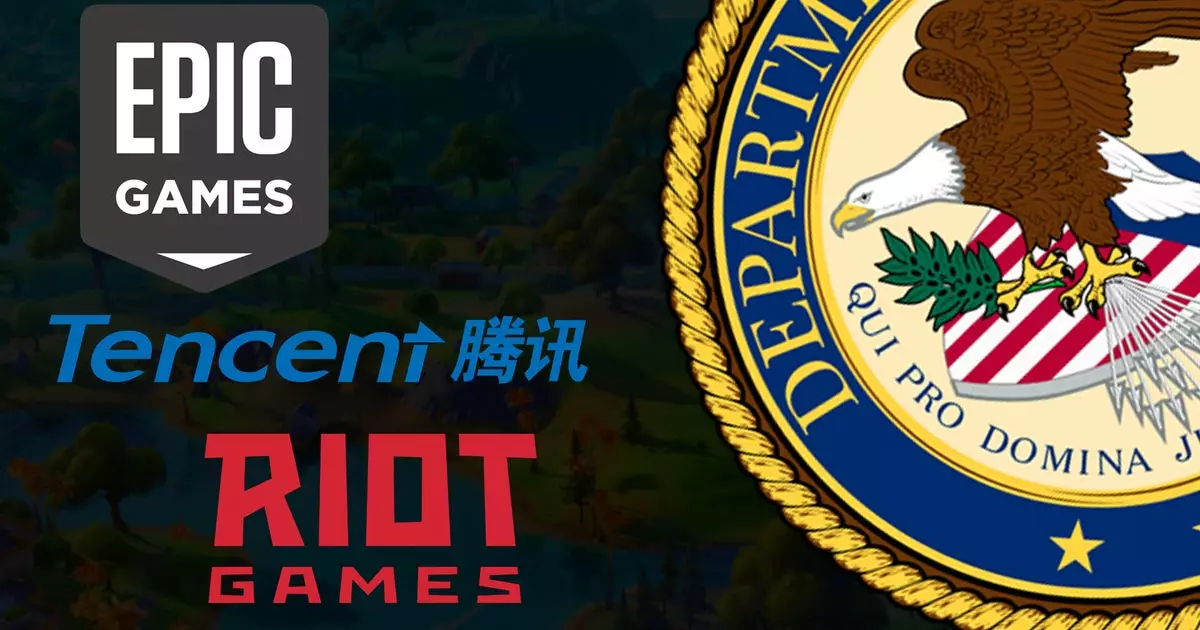In a significant development within the gaming sector, two members of the board of directors at Epic Games have stepped down following scrutiny by the US Department of Justice (DoJ) concerning potential antitrust violations. This decision shines a light on the complex relationship between major companies like Epic Games and Tencent, underlining the need for regulatory oversight in an industry increasingly dominated by a handful of gigantic corporations.
The resignations of Ben Feder and David Wallerstein—both of whom held prominent positions at Tencent—reflects a broader evolution in corporate governance spurred by antitrust laws. The heart of the matter is rooted in Tencent’s strategic interests; the Chinese company holds a minority stake in Epic Games while also owning Riot Games, a competitor in the gaming space. The DoJ’s inquiry revealed a fundamental conflict of interest that raises serious questions about governance and competitive integrity among board members of rival companies.
The situation is reminiscent of classic antitrust scenarios; imagine if a leading executive from Pepsi had the power to influence key decisions at Coca-Cola. This not only poses ethical dilemmas but also threatens a fair competitive landscape. The Clayton Act, which aims to prevent individuals from simultaneously serving on the boards of rival firms, serves as the legal backdrop for this drama. The law’s intent is to ensure that competition remains fair and untainted by undue influence from intertwining corporate allegiances.
The DoJ’s commitment to uphold antitrust regulations is commendable, as it recognizes the complexities of modern corporate interactions. As it stands, the investigation concluded without any admissions of liability from the involved parties. However, the actions taken reflect an unwavering stance against potential monopolistic behavior. The DoJ highlighted that Tencent must amend its shareholder agreement with Epic to eliminate any further influence over board appointments.
Such regulatory measures emphasize the government’s role in maintaining a competitive marketplace. The implications are severe for corporations that might neglect the ramifications of having board members with overlapping interests in rival entities. In a technologically advanced and highly competitive sector like gaming, these regulations are crucial to ensuring that no single player can dominate the market through strategic entanglements.
The exit of Feder and Wallerstein does not merely satisfy legal requirements; it also serves as a lesson in corporate governance. The need for transparent and clear-cut operational boundaries between competing firms cannot be overstated. As the gaming industry evolves, the complexities of shared ownership and executive roles within these immense corporate structures will need to be navigated with diligence.
These resignations prompt other companies in the gaming and technology sectors to reevaluate their board structures and relationships with larger shareholders. Companies may increasingly face scrutiny surrounding the independence of their boards, particularly when a prominent stakeholder is also entrenched in rival businesses. This scrutiny extends beyond Epic Games; various entities could find themselves subject to similar investigations as the scrutiny on competitive fairness intensifies.
The steps taken by the DoJ regarding Epic Games are part of a broader narrative reflecting an increasing concern over anti-competitive practices not just in gaming but across multiple industries. Tech behemoths like Microsoft have previously faced intense regulatory analysis during significant acquisitions, with the government’s focus sharpening on the potential for monopolistic danger. This historical context informs the present scrutiny of Epic Games and Tencent, signaling that the regulatory bodies are keeping a watchful eye on how corporate giants choose to engage.
As the video game landscape continues to evolve, with mergers and acquisitions becoming commonplace, this situation poses critical inquiries about market health. The resignation of directors amidst scrutiny serves as a reminder that maintaining competition’s integrity must remain at the forefront of corporate strategy. For both gamers and industry observers, these developments underscore the importance of vigilance in the marketplace, ensuring that while companies seek growth, they don’t trample on the principles of fair competition.
The recent boardroom changes at Epic Games symbolize a pivotal moment in corporate governance within the gaming industry. They underscore the essential role that antitrust laws play in preserving a competitive marketplace, reminding all stakeholders that the road to innovation must be paved with fairness and integrity.


Leave a Reply